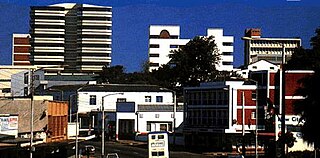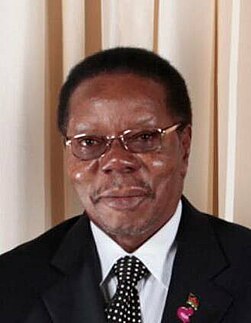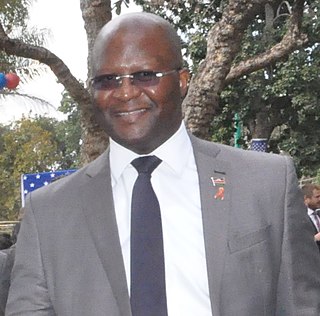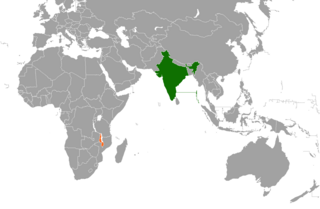
Malawi, officially the Republic of Malawi, is a landlocked country in Southeastern Africa that was formerly known as Nyasaland. It is bordered by Zambia to the west, Tanzania to the north and northeast, and Mozambique to the east, south and southwest. Malawi spans over 118,484 km2 (45,747 sq mi) and has an estimated population of 19,431,566. Malawi's capital is Lilongwe. Its second-largest is Blantyre, its third-largest is Mzuzu and its fourth-largest is its former capital, Zomba. The name Malawi comes from the Maravi, an old name for the Chewa people who inhabit the area. The country is nicknamed "The Warm Heart of Africa" because of the friendliness of its people.

Lilongwe is the capital and most populated city of the African country of Malawi. It has a population of 989,318 as of the 2018 Census, up from a population of 674,448 in 2008. In 2020 that figure was 1,122,000. The city is located in the central region of Malawi, in the district of the same name, near the borders with Mozambique and Zambia, and it is an important economic and transportation hub for central Malawi. It is named after the Lilongwe River.

Blantyre is Malawi's centre of finance and commerce, and its second largest city, with an enumerated 800,264 inhabitants as of 2018. It is sometimes referred to as the commercial and industrial capital of Malawi as opposed to the political capital, Lilongwe. It is the capital of the country's Southern Region as well as the Blantyre District.

Bingu wa Mutharika was a Malawian politician and economist who was President of Malawi from May 2004 until his death in April 2012. He was also President of the Democratic Progressive Party, which he founded in February 2005; it obtained a majority in Malawi's parliament in the 2009 general election.

The University of Malawi (UNIMA) is a public university established in 1965 and until 4 May 2021, when the university underwent a delinking, was composed of four constituent colleges located in Zomba, Blantyre, and Lilongwe. Of the four colleges, the largest is Chancellor College in Zomba. It is part of the Malawian government educational system. The last Vice-Chancellor was Professor John Kalenga Saka. UNIMA celebrated its golden jubilee from the 24 to the 26 September 2015.

Joyce Hilda Banda is a Malawian politician who was the President of Malawi from 7 April 2012 to 31 May 2014. Banda took office as President following the sudden death of President Bingu wa Mutharika. She is the founder and leader of the People's Party, created in 2011. An educator and grassroots women's rights activist, she was the Minister of Foreign Affairs from 2006 to 2009 and the Vice-President of Malawi from May 2009 to April 2012. She had served in various roles as a member of Parliament and as Minister of Gender and Child Welfare before she became the President of the Republic of Malawi.
Madame Ethel Mutharika was the First Lady of Malawi and wife of the President of Malawi, Bingu wa Mutharika. Madam Mutharika was born in Zimbabwe. As First Lady, wa Mutharika was known for her charitable work and had established the Ethel Mutharika Foundation in an effort to help the poor of Malawi. wa Mutharika died in Lilongwe after a long battle with cancer at the age of 63.

Arthur Peter Mutharika is a Malawian politician and lawyer who was President of Malawi from May 2014 to June 2020. Mutharika has worked in the field of international justice, specialising in international economic law, international law and comparative constitutional law. He informally served as an adviser to his older brother, President Bingu wa Mutharika, on issues of foreign and domestic policy from the onset of his election campaign until the President's death on 5 April 2012.
The Nation is a newspaper based in Blantyre, Malawi, owned by Nations Publications Limited. It began distribution on 26 July 1993, and became a daily newspaper on 11 July 1994, coming out on Mondays through Fridays. Its sister newspaper Saturday Nation, now called Weekend Nation, was launched in 1995.

Atupele Muluzi is a Malawian politician, businessman and was a Member of Parliament for Machinga North East constituency from 2004 until May 27, 2019. He is also the President of the United Democratic Front and was a presidential candidate during the 2019 election. He was a running mate in the 2020 presidential elections, on a coalition ticket with incumbent President Peter Mutharika of the Democratic Progressive Party. Muluzi was Minister of Natural Resources, Energy and Mining from 2014 to 2015 and the only opposition member to serve in the Mutharika administration. Subsequently, he served as Minister of Home Affairs and Internal Security in 2015, and then Minister of Lands, Housing and Urban Development in 2015. He is currently Minister of Health. He is the son of former president Bakili Muluzi.
Professor Peter Nelson Mwanza is a Malawian politician. He was appointed Minister of Lands, Housing and Urban Development in the government of President Bingu wa Mutharika of Malawi on 17 June 2009. He was reassigned to become Minister of Agriculture and Food Security in a cabinet reshuffle on 9 August 2010.
The 2011 Malawi protests were protests aimed at winning political and economic reforms or concessions from the government of Malawi. On 20 July, Malawian organisations protested against perceived poor economic management and poor governance by President Bingu wa Mutharika and his Democratic Progressive Party. After the first two days of protests, 18 deaths, 98 serious injuries and 275 arrests had been reported. Further demonstrations were organised on 17 August and 21 September The first protest was later cancelled due to the intervention of a UN representative in initiating a dialogue; however, the talks broke down with more protests planned for Red Wednesday through a national vigil.
The 2012 Malawian constitutional crisis occurred from April 5, 2012 - April 7, 2012 after senior members of the Democratic Progressive Party-led cabinet failed to notify the public of the death of the sitting president, Bingu wa Mutharika on April 5. Instead, cabinet ministers held a series of meetings in Lilongwe, Malawi without vice-president Joyce Banda with the aim of undermining the constitution and Banda's succession to Presidency. News confirming his death had, however, quickly spread across the country through word of mouth, cellphone text messages, Malawian bloggers, Twitter, Facebook, and on listservs by the end of the day on April 5, 2012. Therefore, the failure to announce his death resulted in speculation over the real health of the president and over whether the succession procedures would be followed as outlined in the constitution. According to the constitution, the vice-president takes over but there had been no official word on a successor or communication with the vice-president. Amidst growing speculation, the Cabinet announced that the president's brother, Peter Mutharika, the foreign minister, was the new President of the party on April 6. The Cabinet only announced his death two days after his death, after which Banda became Malawi's first female President.
Raphael (Ralph) Tenthani was a freelance journalist from Malawi. Tenthani was a BBC correspondent and a columnist for The Sunday Times. He was a respected journalist in Malawi well known for his popular column, "The Muckraking". He was well known for providing political analysis on topical issues. He had been the subject of controversy for his candid reporting on political issues. He was very critical of the crackdown on journalism during the Bingu wa Mutharika administration. He was also a columnist for Associated Press, Pan African News Agency, and the Maravi Post.

India–Malawi relations refers to the international relations that exist between India and Malawi.
Grace Chiumia, is a Malawian politician who has served as Minister of Civic education in the Malawian cabinet, since 24 October 2017. Before her current appointment, she was the Minister of Home Affairs and Internal Security, in the Malawian Cabinet, from 6 September 2016 until 24 October 2017.
The following is a timeline of the history of the city of Antananarivo, Madagascar.
The following is a timeline of the history of the city of Yaoundé, Cameroon.
The following is a timeline of the history of the city of Bissau, Guinea-Bissau.
The following is a timeline of the history of the city of Kigali, Rwanda.













